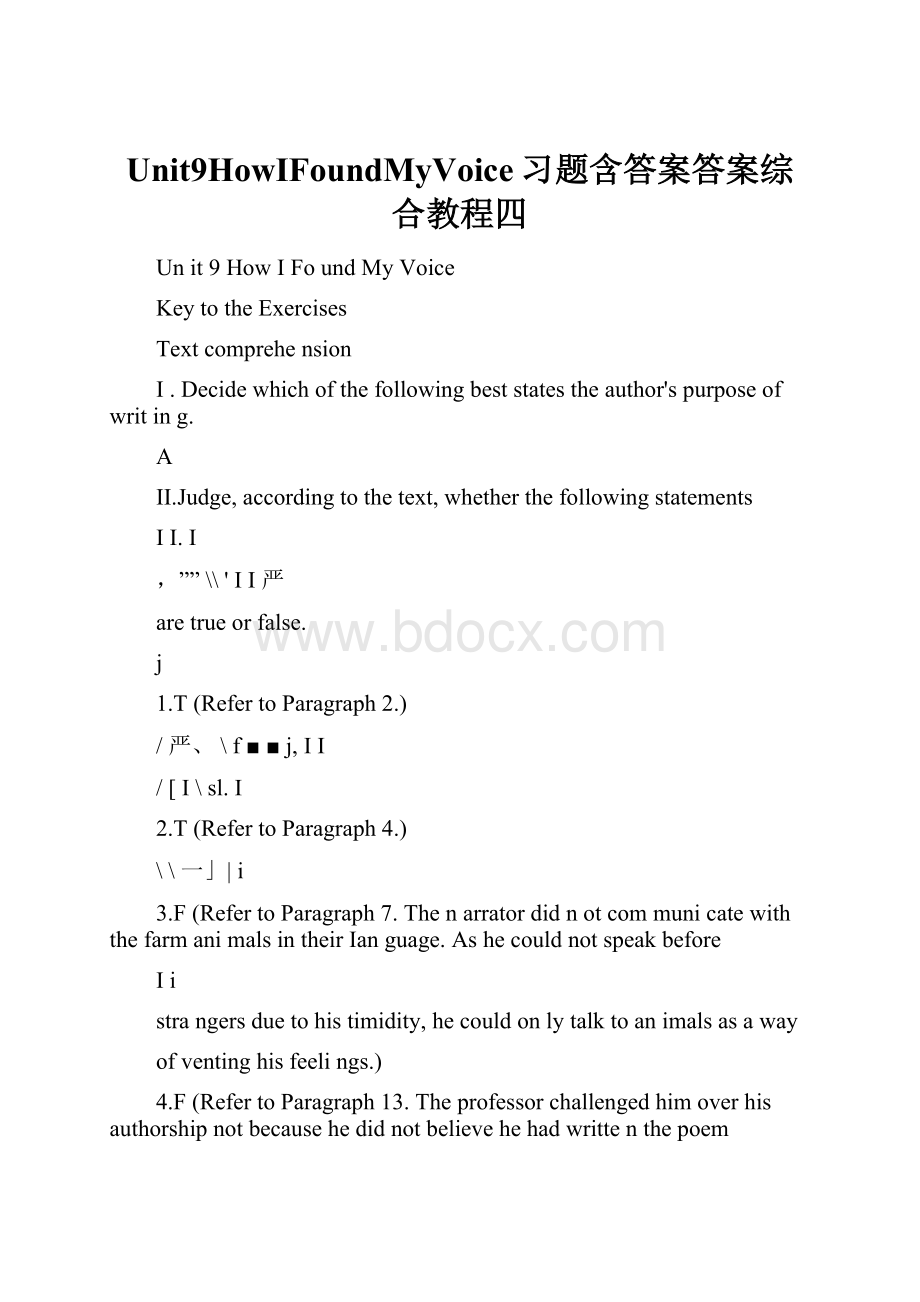Unit9HowIFoundMyVoice习题含答案答案综合教程四.docx
《Unit9HowIFoundMyVoice习题含答案答案综合教程四.docx》由会员分享,可在线阅读,更多相关《Unit9HowIFoundMyVoice习题含答案答案综合教程四.docx(11页珍藏版)》请在冰豆网上搜索。

Unit9HowIFoundMyVoice习题含答案答案综合教程四
Unit9HowIFoundMyVoice
KeytotheExercises
Textcomprehension
I.Decidewhichofthefollowingbeststatestheauthor'spurposeofwriting.
A
II.Judge,accordingtothetext,whetherthefollowingstatements
II.I
,””\\'II严
aretrueorfalse.
j
1.T(RefertoParagraph2.)
/严、\f■■j,II
/[I\sl.I
2.T(RefertoParagraph4.)
\\一」|i
3.F(RefertoParagraph7.ThenarratordidnotcommunicatewiththefarmanimalsintheirIanguage.Ashecouldnotspeakbefore
Ii
strangersduetohistimidity,hecouldonlytalktoanimalsasaway
ofventinghisfeelings.)
4.F(RefertoParagraph13.Theprofessorchallengedhimoverhisauthorshipnotbecausehedidnotbelievehehadwrittenthepoem
butbecausehewantedtoprovoketheboytospeakthewordsinpublicandtriedtohelphimovercomehisstutteringinthisway.)
5.F(RefertoParagraph14.HestaredatProfessorCrouchindisbeliefandevenfeltangryatwhathesaid.)
6.T(RefertoParagraph29.)
III.Answerthefollowingquestions.
1.RefertoParagraph2.Becausethegreatachievementswerefarbeyondtheexpectationsofsuchapoorstuttererasheusedtobe.
Whenhewasyounghewascompletelyunabletospeakinpublicduetohisseriousstuttering.Thushecouldneverimaginethathewouldmakesuchgoodachievements.
2.RefertoParagraph4.Becausehefeltthattheplacehemovedto
:
\\'II严
wasdrasticallydifferentclimaticallyandculturallyfromwherehe
\'Iv—
III.”
hadbeen.
/”■L■-I
I
3.RefertoParagraph6.Becausehewantedtoavoidthe
\"■
humiliationhesufferedthereforhisstuttering.
4.RefertoParagraph7.Becausetheanimalsneverlaughedathim
Ii
andhewasnotnervousatallwhenhetalkedtothemasawayof
ventinghisfeelings.
5.RefertoParagraph9.BecausehelovedEnglishclassics,especiallypoetry,whichwasoneofthesubjectstaughtatthenarrator'sschool.Hisdeeploveforpoetrywasvividlydescribedin
themetaphor:
"Heheldabookofpoemsasifitwereadiamondnecklace,turningpagesasifuncoveringtreasures."
6.RefertoParagraphs13?
8.ItwasProfessorCrouch'strick.Whenthenarratorhandedinhispoem,Crouchpurposefullychallenged
himforhisauthorship.Consequentlythenarratorwasprovokedintorecitinghispoeminthepresenceofhisclassmateswithoutstuttering.
IV.Explaininyourownwordsthefollowingsentences.
1.Hewantedverymuchtobeateacherofourschool.
2.Wefoundastrongconnectionbetweenus.
3.Isupportedmyselfbysweepingfloorsofoff-Broadwaystages
I.I
...”JI'II严
beforetherewasanynewroleformetoplay.
\'IV—
4.Hewasstilllivinginaworldthatwasexcitingandlivelybecause
/”[L•■■I
I
ofallthebeautifulpoemshehadmemorized.
\"■
Structuralanalysisofthetext
Ii
Thisautobiographicalnarrativecanbedividedintothefollowingthreeparts:
Part1,Paragraphs1?
:
theauthorpresentsastrikingcontrastbetweenhissuccessfulcareerasanactorandtelevisionannouncerandhisseverestutteringprobleminhisearlychildhood.
Part2,Paragraphs3?
2:
theauthorrecollectshowhishighschoolteacher,ProfessorCrouch,helpedhimtoovercomehisstutterandfindhisvoice.
Part3,Paragraphs23?
9:
theauthortellsthereaderwhatachievementshemadeafterheovercamehisstutteringproblemandhowgratefulheistohisteacher,"thefatherofmyresurrectedvoice."
Rhetoricalfeaturesofthetext
TheNewTestamentisrepeatedbecausetheauthortakesitashisgreatesthonourtoreadsuchanimportantbookontape.Itisdistributedthiswaybecausetheauthorwantstotellthereaders
[\\'II严
fromthebeginningofhispersonalaccountwhatachievementshe
\'IV—
hasmadesincehegotoverhisstutteringproblemandexpresshis
/”:
L■-I
I
gratitudetothefatherofhisresurrectedvoice.BymentioningNew
\"■
Testamentagainattheendofthenarrative,theauthorsuccessfullyharksbacktotheopeningparagraphandthusunifiesthetextinto
II
anorganicwhole.
Vocabularyexercises
I.Explaintheunderlinedpartineachsentenceinyourownwords.
1.severe
2.smoothnessinspeaking
3.colleague
4.closerelationshipbasedoncommoninterest
5.forcedmetodoanything
6.animated
7.
Fillintheblankineachsentencewithawordorphrasefromtheboxinitsappropriateform.
words.
1.
narrative
2.
critical
11
3.
fortunate
4.
abundance
5.
worship
6.dramatically
7.
fluent
8.
resurrection
IV.Choosethewordthatcanreplacetheunderlinedpartineachsentencewithoutchangingitsoriginalmeaning.
1.A2.B3.C4.D
5.A6.C7.B8.D
V.Giveasynonymoranantonymofthewordunderlinedineachsentenceinthesenseitisused.
1.Antonym:
mild(agreeable,gentle)
2.Synonym:
passionate(enthusiastic,ardent)
3.Synonym:
comment(assessment,evaluation)
4.Synonym:
doubt(uncertainty)
5.Antonym:
certain(definite,positive)
6.Synonym:
scornful(mocking)
I.II
...”J\\'II严
7.Synonym:
instruction(teaching,tuition)
\II
j
8.Synonym:
enjoy(appreciate)
/”\X-■■■|
/[I\al.I
ii../亠
\\一」I
VI.Explainthemeaningoftheunderlinedpartineachsentence.
1.place2.preserve
Ii
3.whereas4.Despite
5.verywell6.extension
Grammarexercises
I.Notetheuseoftheitalicizedpartsinthefollowingsentences.
Canandcouldcanexpressability,permissionandpossibility.In
Sentence1,couldexpressespossibility.Insentence9,canexpressespermission.InSentence8,couldseeshowstheactionisinprogress.
InSentences3,4and5,couldexpressesthegeneralpastability,whileinSentences2,6,7and10,couldisusedinthenegativesentencestorefertothepastability,generalorspecific.
II.Correcttheerrors,wherefound,inthefollowingsentences.
1.Icanfeelsomethingcrawlingupmyleg.
2.Heranveryfastandwasabletocatchthebus.
3.Bythetimeshefinisheshercourse,shewillbeabletospeakEnglishwell.
\'I|小x
4.P
\IV—
5.Inyesterday'scompetition,Janewasabletospellthenewwords
/”4-l|
f[I\si.|
withoutmakingasinglemistake.
\\一」|i
6.P
7.Italkedforalongtime,andintheendIwasabletomakeher
Ii
believeme.
8.P
III.Rewritethesentenceswherecouldcanbeused.
1.Couldwemeetagaintomorrow?
2.Shecouldsinglikeanangelwhenshewasakid.
3.Johnwassodrunkthathecouldn'topenthedoor.
5./
6.Youcouldtalkwithyourteacher.
7.Nooneknowswhereheis.HecouldbeinParis.Hecouldbein
London.
8.CouldIuseyourphone?
IV.Rewritethefollowingshortdialogue.Trytomakethetone
soundmoretentative.
A:
Excuseme,wouldyouopenthisdoor?
...”:
\'II严
B:
rmafraidit'slocked.ShallIgetthekey?
\4』'IV—
j
A:
Please,ifyouwouldn'tmind,asquicklyasyoucan.
/”;疔•■■I
I
V.Inserttheadjectivesoradverbsgiveninbracketsinthecorrect
\"■
positions.
1.ThreeprettylittleFrenchgirlscametoteayesterday.
Ii
2.IspentalonghappytimelivinginGermanyyearsago.
3.IhavehardlyeverworkedsohardasIdidyesterday.
4.Werarelygetmorethanthreeconsecutivedaysofhotweather
insummer.
5.Thereweretwohardwoodenchairsinthewaitingroom.
6.Maryhasoftenspokenofyourkindnesstoherwhenshewas
stayinginAustriasomeyearsago.
7.Everybodyconcernedmustbereadytoleaveat8:
30tomorrow.
8.Wehavenotyetobtainedalltheinformationyourequestedyesterday.
VI.Makesentencesofyourownafterthesentencesgivenbelow,keepingtheunderlinedstructuresinyoursentences.
(Refereneeversion)
1.Initspresentstate,theeconomycouldn'tstandanotherrisein
interestrates.
2.Hestoodasifrootedtotheground.
:
\\'II严
\'IV"』
III.”
Translationexercises
/”■--■I
I
I.TranslatethefollowingsentencesintoChinese.
1.从那生活温暖而舒适的鲶鱼之乡搬到气候严酷而且人似乎也大不相同的北方,是一件令人不安的事。
2.我惊讶地站着,然后在一片激烈的掌声中恍恍惚惚地飘回到我的
座位上。
3.随着年龄的增长,我那种嗓音被卡在喉咙里的可怕感觉变得更加
糟糕了。
4.尽管我的老师再也看不见了,他却依然生活在一个充满着他以前所收藏的奇珍异宝的世界里。
II.TranslatethefollowingsentencesintoEnglish,usingthewordsorphrasesgiveninbrackets.
1.Withthedevelopmentofeconomylargenumbersoffarmersfloodedfromthecountrysideintocitiestoseekajob.
2.Youngasheis,alljudgessharetheopinionthathisperformanceattheinternationalpianocompetitionhascomeclosetoperfection.
3.Perhapsbecauseofthespiritsshehaddrunk,shewasinadazeallthewaytoLondon.
4.Inthismountainretreatyoucanfindthebestclimateinthecountry.
...”J\\'II严
5.Heleanedbackintohisseatandrelaxed,savoringthecomfort.
\IV—
6.Whatmakesthisyoungcoupleproudisthattheirchildcould
/”s---■■■I
I
recitepoemsfrommemoryattheageofthree.
\"■
7.Herepeatedinpublicwhathehadsaidinprivate.
8.Afamilyvibrantwithlifeandloveistobebuiltwiththejoint
Ii
effortsofallitsmembers.
II.TranslatethefollowingpassageintoChinese.
从8岁到11岁,我在英格兰巴思的一所教会小学上学。
那是一所很小的学校,由4个班级组成,每个班大约25个孩子,按年龄分班。
一般都是由一个老师负责教一个班的全部课程。
但是校长罗纳德布罗克斯偶尔也会到班里来,用大约一个小时的时间讲授他特别喜欢的课程。
他对我很感兴趣,并且很快就知道我喜欢破解难题。
他
经常在我进教室的路上拦住我,从口袋里掏出一张纸条给我,上面通常写着数学或逻辑方面的难题。
随着时间的推移,题目难度逐步增大,可我非常喜欢。
这些小纸条点燃了我对数学和解题的热爱,这种热爱一直保持到今天。
当我找出答案时,我会觉得那种智力活动很有价值,或许更重要的是,那是一种巨大的乐趣。
Exercisesforintegratedskills
I.Dictation.
Ashumanbeings,/wehavethespecialabilitytoshareour...”4\\'II严
thoughtsbytalking./Westartbyformingathoughtinourbrains./
\'IV—
Inthebrain,/thisthoughtischangedintoacodecalledIanguage./
/”■r■■I
I
Finally,thebrainsendsamessagetothemuscles,/tellingthemto
\"■
move/and